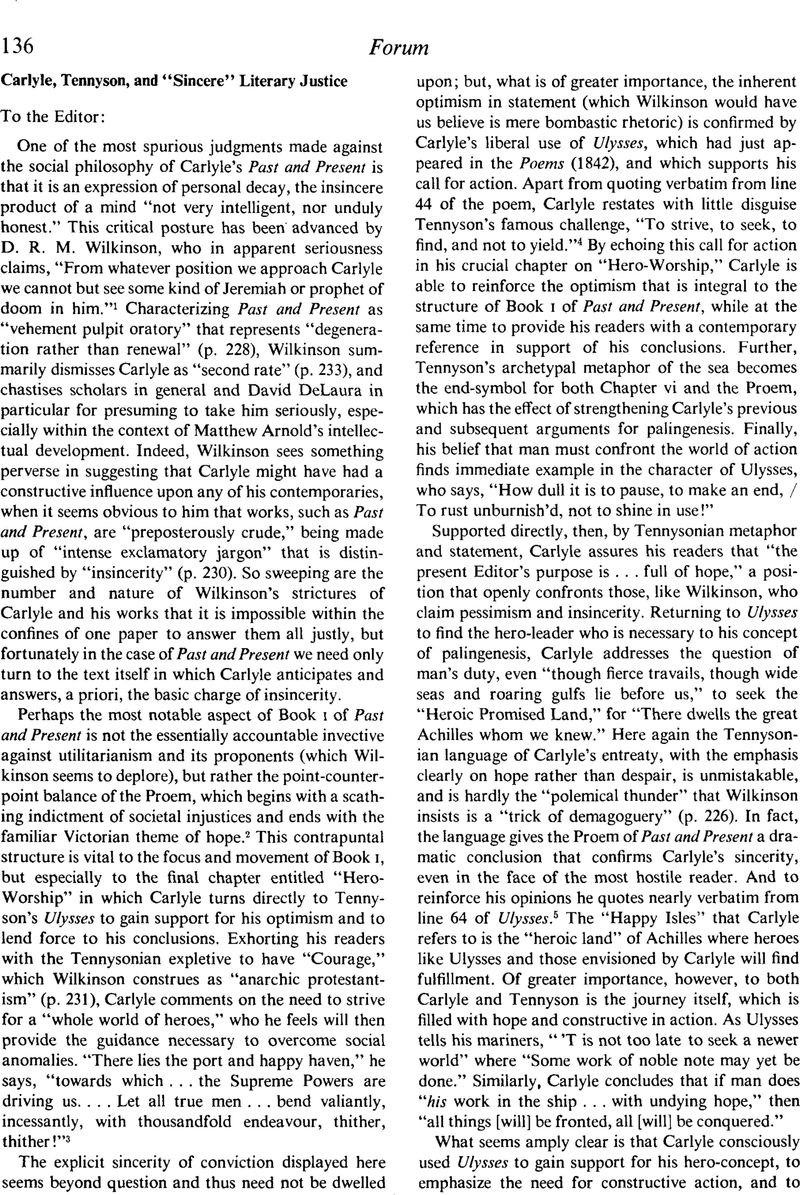No CrossRef data available.
Article contents
Carlyle, Tennyson, and “Sincere” Literary Justice
Published online by Cambridge University Press: 01 December 2020
Abstract

- Type
- Forum
- Information
- Copyright
- Copyright © Modern Language Association of America, 1973
References
1 See D. R. M. Wilkinson, “Carlyle, Arnold, and Literary Justice,” PMLA, 86 (March 1971), 230, 227. In taking the position that Carlyle was a purveyor of “gloom,” Wilkinson uses Clough's statement, “Carlyle led us out into the wilderness and left us there,” but fails to consider any contemporary opinion to the contrary. Even Trollope, who satirizes Carlyle as “Dr. Pessimist Anticant” in Ch. xv of The Warden, admits with direct reference to Past and Present, “We all of us could, and many of us did, learn much from the doctor,” who “gave us some hope.”
2 Although she does not comment on Carlyle's use of Ulysses, Grace Calder, The Writing of Past and Present (New Haven, Conn.: Yale Univ. Press, 1949), pp. 106–97, examines the dualism in structure in Books iii and iv, which is an expansion of the Proem.
3 References are from Past and Present, ed. Richard Altick (Boston: Houghton, 1965), pp. 40–42.
4 References are from Poems of Tennyson, ed. Jerome Buckley (Boston: Houghton, 1958), pp. 66–67.
5 Although he slightly misquotes the line, Carlyle footnotes it in the text to draw attention to its significance. This and the preceding two lines of Ulysses were favorites of his. In a letter to Tennyson on 7 Dec. 1842, he writes, “These lines do not make me weep, but there is in me what would fill whole Lachrymatories as I read.” See Hallam Lord Tennyson, Alfred Lord Tennyson: A Memoir by His Son (New York: Macmillan, 1897), i, 214.
6 See Charles Richard Sanders, “Carlyle and Tennyson,” PMLA, 76 (March 1961), 83, 97.
7 It is true that Arnold attempts to discredit Carlyle's concept of the ruling aristocracy, but he does at the same time admit that Carlyle is “a man of genius to whom we have all at one time or other been indebted for refreshment and stimulus.” See Culture and Anarchy, ed. J. Dover Wilson (Cambridge, Eng.: The University Press, 1963), p. 83.
8 In disputing DeLaura's point that Carlyle exerted a “pervasive influence” over Arnold in the 1860's, Wilkinson says, “This is not just an overstatement: it is simply not true, and Mr. DeLaura knows it is not true, which is what is so puzzling” (p. 232). The absoluteness of this position is at best singularly unpropitious, particularly in the light of Arnold's own testimony to the contrary.
9 In pronouncing Carlyle “second rate” Wilkinson uses the British Council publication as the authority to refute (p. 235, n. 16). With due respect to David Gascoyne, it is apparent that Wilkinson is not aware that the pamphlet is intended for general rather than scholarly consumption, and thus hardly worthy of the authoritativeness that he conveniently places upon it.
10 Although not within the province of this response, other specific comments by Wilkinson bear noting. He feels Sartor Resartus “dull[s] one's responses,” is an “exhibition of solemn unaccommodating egotism,” and is “colored by a snarl of indulged anger” (p. 227); he objects to the “emptiness of the message” in The French Revolution, which “does not really challenge at all, which is probably why it was so popular (pp. 229–30); he finds much of Heroes and Hero-Worship ”dramatic nonsense,“ as well as ”platitudinous and oracular—not to mention vulgar“ (pp. 227, 231); and he credits Carlyle as being ”one of the prime agents in training the nineteenth century to absorb and applaud crude rhetoric and sentimental profundities without flinching“ and in doing so ”succeeded in passing himself off as a national sage“ (p. 230). What place these outrageous remarks, and others like them, have in an essay that has as its expressed purpose ”the interests of literary justice“ (p. 234) is certainly not made clear.
11 See Ralph Waldo Emerson, “Past and Present,” The Dial, 4 (July 1843), 96, 101.




